SCERT AP 7th Class Social Study Material Pdf 12th Lesson Markets Around Us Textbook Questions and Answers.
AP State Syllabus 7th Class Social 12th Lesson Questions and Answers Markets Around Us
7th Class Social 12th Lesson Markets Around Us Textbook Questions and Answers
Review of Your Previous Knowledge
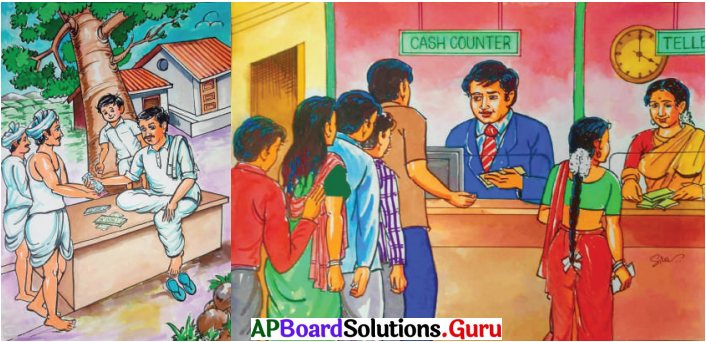
Introductory Pictures
Question 1.
What do the above pictures convey?
Answer:
The picture tells us about a market.
Question 2.
Why do people gather there?
Answer:
People gather there to buy vegetables, fruits and provisions, clothes etc.
Question 3.
What kind of things are sold there?
Answer:
Fruits, vegetables, clothes, provisions etc., which are our daily needs are sold there.
Improve Your Learning
I. Answer the following questions.
Question 1.
What is a market? Briefly explain different types of markets.
Answer:
A market is a place where buyers and sellers interact with each other.
Types of Markets :
Depending upon the nature and geographical location, markets can be broadly classified into two types. ^
They are :
i) Physical Markets and
ii) E- Markets
1) Physical Markets : A Physical market is a place where buyers can physically meet the sellers and purchase the desired items from them.
Types of Physical Markets :
- Local market
- Regional market
- National market
- International Market
- Neighbourhood market
2) E – Market: We can place orders through our mobile phone or a computer device with internet and can buy a variety of things which we like without stepping out from our home.
![]()
Question 2.
“Weekly markets are gradually disappearing”. Do you agree with this statement? If so, mention the reasons.
Answer:
Yes. I agree with the statement by the following reasons.
- Heavy competition from Rythu Bazaars.
- Weekly market vendors face mass competition from local shops, supermarket like Big Bazars D-Mart, etc.
- Lack of Formal Credit Access.
- Lack of space for market, etc.
Question 3.
“Festival days increase sales” do you agree, support your answer.
Answer:
Yes, I agree with this statement.
- It’s because, Indian festivals are celebrated in a big way.
- Every festival has certain rituals to follow and we worship different gods and goddesses.
- Then, there is a practice of wearing new clothes while offering puja as it’s new, fresh and gives sacred feeling.
- Sd, people buy new clothes during festivals.
- People use to do lots of shopping during festivals to decorate their home, they bring new clothes, sweets and gifts for their relatives and friends.
Question 4.
Prepare a list of goods available in a weekly market and compare them with the goods available in neighbour markets.
Answer:
| Goods available in Weekly Market | Goods available in Neightbour markets |
| 1) Vegetables | 1) Books |
| 2) Grains | 2) Medicines |
| 3) Animals | 3) Eatables |
| 4) Forest Products, etc. | 4) Groceries |
| 5) Toys & Kids articles, etc. |
Weekly Markets: Shops are temporary.
Neighbour Markets : Shops are permanent.
Question 5.
What is the aim of Consumer Protection Act 2019?
Answer:
It aims to provide timely and effective administration and settlement of consumer dispute in the digital age.
Question 6.
Write any three consumer rights.
Answer:
Following are the Rights of consumers.
1) Right to safety :
Certain goods may cause serious injuries. These goods are pressure cookers, gas cylinders, electrical goods, etc.
If there is any manufacturing defects in the goods, consumers have right to be protected against their fatal risk.
2) Right to be informed :
A consumer has the right to be informed about the quality, quantity and price of the product.
3) Right to Choose :
The consumer has the right to choose the product of his choice out of the alternative products available.
4) Right to seek redressal :
Consumer have the right to seek redressal against unfair trade practices and exploitation.
Question 7.
Prasad makes a living by selling his two buffalo milk. Can it be called business? If so, what advice would you give to expand his business on a large scale?
Answer:
Yes, it is called a business.
Suggestions to expand the business :
- He take the loan from the bank for the business.
- Provide best shelter to cattle and nutritious fodder.
- Find suitable market and transport facilities.
- Tie up with diary products, industries, hotels, etc., to increase business opportunity.
II. Choose the correct answers.
1. A person fixed a sum of amount in a National bank and is getting monthly income on it. This income return is known as.
A) Salary
B) Rent
C) Interest
D) Commission
Answer:
C) Interest
2. In which of the following markets are the goods available at cheaper rates.
A) Shopping Mall
B) Weekly Markets
C) E-Market
D) Neighbour Markets
Answer:
B) Weekly Markets
3. Which of the following goods has a demand in the International market?
A) Gold
B) Jewellery
C) Petroleum
D) All the above
Answer:
D) All the above
4. People who buy goods on large scale are known as.
A) Wholesaler
B) Retailer
C) Trader
D) None
Answer:
A) Wholesaler
5. For online shopping we can pay through the following method
A) Net banking
B) Credit Card
C) Debit card
D) All the above
Answer:
D) All the above
III. Match the following.
| 1. Internet Banking | a) Shopping Malls |
| 2. International Market | b) Producer |
| 3. Farmer | c) Petroleurn |
| 4. Multinational Companies | d) Digital Payments |
| e) Retailer |
Answer:
| 1. Internet Banking | d) Digital Payments |
| 2. International Market | c) Petroleurn |
| 3. Farmer | b) Producer |
| 4. Multinational Companies | a) Shopping Malls |
IV. Fill in the blanks with suitable words:
1. ……………… is the return for Land.
2. A person who buys goods and services is known as ………………..
3. The persons who finally sell goods to consumers are known as …………….
4. On which day date we observe National consumers day ………………..
Answer:
- Rent
- Consumer
- Retailer
- 24th December
7th Class Social 12th Lesson Markets Around Us InText Questions and Answers
7th Class Social Textbook Page No. 76
Question 1.
Collect and display different images of various shopping malls. Ans. Student Activity.
Answer:
Ex:
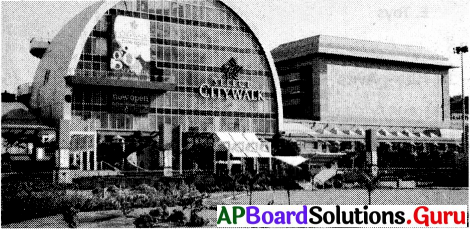
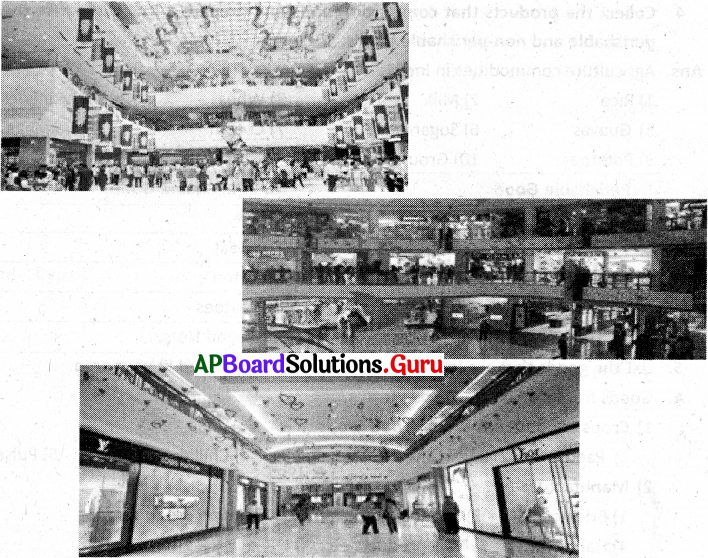
7th Class Social Textbook Page No. 77
Question 2.
Distinguish between shopping malls and shopping complexes.
Answer:
Shopping malls :
Large muity storeyed, air-conditions shops on different floors known as malls. We can buy various branded goods. They also have restaurents, banks, multiplexes, spas etc.
Shopping Complex :
The place where people can buy various products in different shops at one places. These may be identified in small towns as well.
7th Class Social Textbook Page No. 79
Question 3.
Visit a wholesale shop and collect the prices of different goods and compare the same with the prices of a retail shop.
Answer:
| Prices in a Wholesale shop | Price in Retail shop |
| 1. Cello pin point Ball pen – (Pack of 10 pens) – 85/- |
Cello pin point Ball pen (Pack to 10 pens) – 100/- |
| 2. Classmate notebook – 31/- | Classmate notebook – 50/- |
| 3. Bicycle price – 8,720/- | Bicycle price -10,225/- |
| 4. Idly Ravva – 23/- | Idly Ravva – 30/- |
Question 4.
Collect the products that come from farms and prepare a list. Categorise them into perishable and non-perishable goods.
Answer:
Agriculture commodities in India :
- Rice
- Milk
- Wheat
- Mangoes
- Guavas
- Sugarcane
- Cotton
- Bananas
- Potatoes
- Groundnuts, etc.
| Perishable Goods | Non-Perishable Goods |
| 1. Milk | 1. Rice |
| 2. Mangoes | 2. Wheat |
| 3. Guavas | 3. Cotton |
| 4. Sugarcane | 4. Potatoes |
| 5. Bananas | 5. Ground Nuts |
![]()
Question 5.
List the goods that are locally cultivated or manufactured in your area.
Answer:
Goods from agricultural lands :
1) Crops – Food crops & Non-Food Crops
- Paddy
- Sugarcane
- Vegetables
- Chillies
- Cotton
- Pulses etc.
2) Manufactured
- Bricks
- Paper boxes
- Kalamkari products
- Handicrafts
- Milk products etc.
7th Class Social Textbook Page No. 80
Question 6.
Prepare a list of goods and categories them into paid goods and free goods.
Answer:
| Free Goods | Paid Goods |
| Free goods : Air, River water in the village, sunlight, etc. | Paid Goods : Pen, notebooks, clothes, etc. |
| Services : Education in govt, school. Health treatment in govt, hospital etc. |
Services : Education in Private school. Health treatment in Private hospital. |
Question 7.
Collect the information about occupations of different sectors.
Answer:
Our entire economy is divided into 3 sectors.
1) Primary Sector:
Occupations in Primary Sector :
- Agriculture
- Cattle rearing
- Mining
- Forestry
- Fishing
- Poultry, etc.
2) Secondary Sector:
Occupations in Secondary Sector :
- Constructional Activities
- Manufacturing Activities
3) Tertiary Sector:
Service Sector occupations : Banking, commerce, communications, real estates, doctors, lawyers, teachers, transportation, etc.
Think & Respond
7th Class Social Textbook Page No. 71 & 72
→ Kamala and her son Balu went to the market on Sunday morning. Balu noticed, a variety of fruits and vegetables there. He also noticed fruit and vegetable shops, as well as grocery and fancy shops, Balu’s mother, bought some fruits and vegetables from the market. Meanwhile, Balu asked the fruit seller for mangoes, but he replied that the mangoes were only available during the summer and now they are not available because of the winter. The boy then asked his mother for a cricket bat. So she bought it. Finally, they left the market with the goods they had bought.
Read the above paragraph and answer the questions (1-3).
1. What did Balu observed in the Market?
Answer:
Baiu observed variety of fruits, vegetables, groceries, and fancy shops, and sports goods like cricket bat etc.
2. What did Baiu and his mother bought in the Market?
Answer:
Fruits, vegetables and cricket bat.
3. Write about the market of your home town / village.
Answer:
I live in a small town. In our town there is a small market next to busstand. It contains various shops like groceries, fruit venders, vegetables venders etc. It get vegetables twice a week from Banglore. Once in a week, local market / santa will be arranged next to the market. People with buy various goods on that day.
7th Class Social Textbook Page No. 72
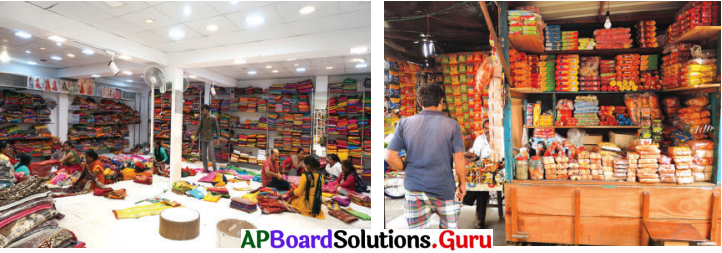
Observe the above pictures and answer the following questions (4-7) :
4. Which shop is in the first picture?
Answer:
Cloth shop, various kinds of clothes, dresses are sold here.
5. What are the persons doing in the first picture?
Answer:
Shop keepers, salesmen show their products to consumers and help them to buy their
6. What do you observe in the second picture?
Answer:
Various kinds of goods / groceries required at home are sold here in grocery shops.
7. Name some items kept in the shelves of the general store.
Answer:
Biscuits, paste, bread, soaps, dish clean items, pens, bread, mosquito coils, popcorn, chips packets etc.
7th Class Social Textbook Page No. 73
Question 8.
Differentiate between National and International Markets.
Answer:
National Markets :
The market which have scope for trade through out the country. Goods will be kept available for consumption across the country. Ex : Coconut products have market across the country.
International Market :
Trading of goods and services among the various countries is known as international market. Ex: Oil from OPEC countries, Electronic goods from Japan, China, Spices from India.
![]()
Question 9.
What is the importance of local markets?
Answer:
- Goods and services kept available for consumption in our neighbourhood areas.
- Farmers, small sale producers find market for their products.
- Since they are available from nearby places, the goods may be priced low than international or national markets.
- They help to circulate flow of money in their habitation and help to achieve prosperity.
Question 10.
Name some spices which are available in your local markets.
Answer:
Pepper, chilli, turmeric, ginger, dry ginger, oregano, pudina, basil, etc.
7th Class Social Textbook Page No. 74
Question 11.
What kind of shops do you observe in your neighbourhood? What do you purchase from them?
Answer:
- Grocery shops, medical shops, fancy stores, shops that sell fruits, vegetables, diary products, tailoring materials, etc.
- I used to by stationary, milk products, grocery, fruits and vegetables, etc.
Question 12.
What is a digital payment?
Answer:
- The method which requires internet bank facility that can be operated through mobile opp or through website.
- Amount will be transfered as payment to trader / seller for the product the consumer purchase.
7th Class Social Textbook Page No. 75
Question 13.
What are the advantages of Rythu Bazar?
Answer:
- Rythu Bazar is a place provided for farmers to sell their products to the consumers directly.
- These markets provide both the producer and consumer get require benefit in their transation by avoiding mediators.
- Consumers get quality products.
Question 14.
“The prices of goods are cheaper at weekly markets than the neighborhood markets or shopping malls”. Why?
Answer:
- As the shopkeepers need not pay any rents, and shop maintenance cost will be very less.
- No need to apy taxes to government.
- No middle men to gain more profit.
- As consumers pay immediately, they whish to sell their goods at minimum profits.
- No cost or less transportation cost.
7th Class Social Textbook Page No. 75 & 76
→ Sanju and Manu made a visit to a shopping mall, the most exciting and fascinating places they have ever visited. They both wondered at the wandering people Tiere and there. They got on to the battery-operated cars and bikes. They made an exciting trip all around the mall onpayment. Later, their eyes fell on the delicious flavours and different cuisines. They enjoyed the taste of cotton candies, milk shakes and ice creams.
They bought new clothes, shoes, caps and belts. They bought so inany soft toys too. They felt very well satisfied in the mall.
Answer the following questions (15-17) based on the above Information.
Question 15.
Why did Sanju and Manu pay for their enjoyment in the mall?
Answer:
They had ride on battery operated cars and bikes. They purchased eatable products, clothes, shoes, caps, belts, soft toys. They spent their time at various a.musement places.
Question 16.
Why did all the shopping malls make such attractive arrangements as mentioned in the above situation of Sanju and Manu?
Answer:
- To provide recreation to the people who are vexed with daily routine.
- People can buy various products at one place.
- To provide tourist attraction.
- Kids can find lot of fun by playing various games.
Question 17.
Prepare a list of goods bought by Sanju and Manu.
Answer:
New clothes, shoes, caps, and belts, soft toys, eat sugar candies, milkshakes, and ice creams.
7th Class Social Textbook Page No. 76
Question 18.
What impact do you think shopping malls run by multinational companies will have on retail business?
Answer:
- They attract customers by offering discounts and gift vouchers and with wide range of products.
- Retail business of the local area get affected very badly.
- Money circulation will shift to out of the state/countries that cause decline on local areas.
- Small shopkeepers have to close their business.
- Increase unemployment cause poverty.
7th Class Social Textbook Page No. 78
Question 19.
How can you buy goods through online markets?
Answer:
- We can buy goods through mobile apps, online shopping websites.
- We can verify the colour, quality of products from the information and can place order to deliver our place.
![]()
Question 20.
What are the advantages and disadvantages of online .shopping?
Answer:
Advantages:
- Can find wide range of products with various choices.
- Can compare prices and qualities to choose the best.
- Can buy at zero physical stress and product will be door delivered.
- Can use cash on delivery, pay later etc.
Disadvantages:
- Can’t assess the quality accurately.
- Prices may high.
- Money transactions may get failed or we may be cheated by fraud sellers.
- If required, return policies may not easy.
Question 21.
How do you pay for online shopping?
Answer:
- We can pay through credit, debit cards by using digital, payment through online transactions or through UPI payments.
- Certain companies, shopping sites allow consumers to pay on delivery.
Question 22.
“Buying goods through online market affects the local traders”. Do you agree/disagree with this statement? Give your reasons.
Answer:
Yes, I agree this statement to some extent. Now-a-days the IT revolution made our life easy access through internet. Most of consumers from urban, semi urban areas and few rural areas can buy goods.
This may affect the local shopkeepers business. Money circulation will be shifted from local areas to outside the country. This will destroy our economy.
7th Class Social Textbook Page No. 79
→ Anwar is a wholesale trader of fruits. He purchases different kinds of fruits in bulk from different areas i.e., Mangoes from Nujiveedu and Ulavapadu, Grapes from Ananthapur and Bangalore, Pomegranate from Sholapur, bananas from Mahanandi and Nandhed and stores them in his warehouse. All the retail fruit merchants and hawkers of the town purchase these fruits from Anwar and then they sell the same to the consumers in the town and in the surrounding villages.
Answer the following questions (23, 24) based on the information given in the above box.
Question 23.
How does a retailer get goods for his shop?
Answer:
He purchase the products (fruits) from wholesale traders.
Question 24.
Why do you think a wholesaler is important in the distribution of goods?
Answer:
Wholesale trader buy goods directly from producer or farmer. He brings products from produced areas to market and keep them availiable for retail traders. They provide market to producers of various places.
Question 25.
“Cottage industries are a boon to the rural unemployed”. Discuss.
Answer:
- They provide alternate employment to rural people who can’t accomodate in agriculture.
- Women can Work in cottage industries to get additional income.
- Various products can have global market which have special qualities.
Ex : Laces from Narsapur, toys from Kondapalli.
Question 26.
Do you have any cottage industries in your area?
Answer:
Yes, in our village Nandamuru in Krishna district we have carton making factory.
7th Class Social Textbook Page No. 80
Question 27.
What is the source of income for your family?
Answer:
The main source of income for my family is salary of my father.
Question 28.
How does a farmer earn money for his family needs?
Answer:
Farmers grows crops in his farm. He sell the products in market. Few farmers work with their family members in fields. Small farmers and landless labourers work in other fields. Few of them earn money from other farming activities.
7th Class Social Textbook Page No. 81
Question 29.
What is the use of Consumer Protection Acts?
Answer:
Use of Consumer Protection Acts: Consumer Protection Acts provide safety and security of their transaction. Help to get protection against cheating, products of low quality exchange of products etc.
Explore
7th Class Social Textbook Page No. 74
Question 1.
Ask you teacher about different e-payments?
Answer:
Different types of e – payments :
1. Credit / Debit card payments :
Payments through cards are most widely used and popular method.
2. Bank transfers :
Customers enrolled in internet banking can do bank transfers for their online purchase.
3. E Wallets :
E wallets require a sign up from merchants as well as customers. After creating an e – wallet account and linking it to the bank account they can withdraw or deposit funds.
4. Moble payments :
To set up a mobile payment method, the customer has to download and link it to the credit card.
5. Cash :
Cash is often used for physical goods and cash-on-delivery transactions.
7th Class Social Textbook Page No. 77
Question 2.
Collect more information about floating markets and discuss in your class room.
Answer:
A floating market is a market where goods are sold from boats.
Originating in times and places where water transport played an important role in daily life. Most floating markets operating today mainly serve as tourist attractions.
Ex : Kolkata’s Patuli area in West Bengal
Goods : Fruits, vegetables and fish available.
![]()
Question 3.
During the Covid 19 pandemic, many people bought goods online. Discuss the reasons for this with your friend.
Answer:
About 59% of people purchased things through online because of, they were practicing social distancing and wanted to minimize their time outside of the home. To avoid the queues in the super market.
7th Class Social Textbook Page No. 73
Question 1.
What are the goods available in your local market?
Answer:
Mostly perishable goods are available in my local markets.
Ex : Vegetables, fish, eggs, milk, etc.
Question 2.
List out the goods which are available in your region.
Answer:
Mangoes, vegetables, dais, onions, jaggery, kalamkari goods, kondapalli toys, etc., are available in my region.
Question 3.
Name some goods which has a National market.
Answer:
Market for airline travel, smart phones, new cars, pharmaceuticals, products and the markets forfinancial services such as banking, martgages etc., has a National Market
Question 4.
Name some goods which have an international market.
Answer:
Gold & Platinum have an international market.
7th Class Social Textbook Page No. 74
Question 5.
Read the song “In the Bazaars of Hyderabad” written by Mrs. Sarojini Naidu.
Answer:
In The Bazaars of Hyderabad
What do you sell O ye merchants?
Richly your wares are displayed.
Turbans of crimson and silver,
Tunics of purple brocade,
Mirrors with panels of amber,
Daggers with handles of fade.
What do you weigh, O ye vendors?
Saffron end lentil and rice.
What do you grind, O ye maidens?
Sandalwood, henna, and spice.
What do you call, O ye pedlars?
Chessmen and ivory dice.
What do you make,0 ye goldsmiths?
Wristlet and anklet and ring.
Bells for the feet of blue pigeons
Frail as a dragon-fly’s wing,
Girdles of gold for dancers,
Scabbards of gold for the king.
What do you cry,0 ye fruitmen?
Citron, pomegranate, and plum.
What do you play ,0 musicians?
Cithar, sarangi and drum,
What do you chant, O magicians?
Spells for aeons to come.
What do you weave, O ye flower-girls
With tassels of azure and red?
Crowns for the brow of a bridegroom.
Chaplets to garland his bed.
Sheets of white blossoms new-garnered
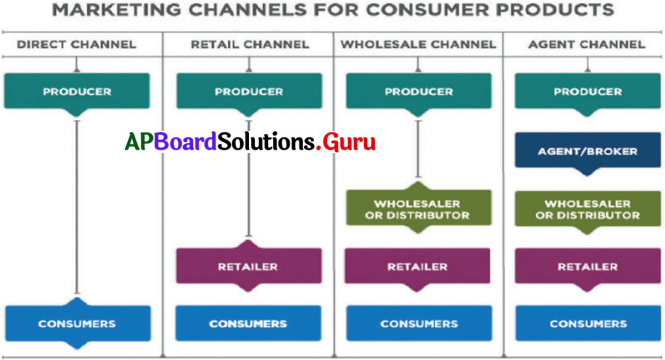
7th Class Social Textbook Page No. 78
Question 6.
Observe the above flow chart and with the help of your teacher, find out which way the customer is getting cheaper and the reason for it?
Answer:
Wholesale channel is the best to consumer because wholesale seller brought from producer in a bulk way. To the consumer not necessary the things in* a bulk manner.
So the consumer get the goods with fine quality and quantity and at cheaper prices from wholesale channel.
Question 7.
The price of the products hike if there is an agent between the producers and consumers. Discuss.
Answer:
Generally the prices of the products like if there is an agent between producers and consumers. Because the agent brought the good from the producer, so he add some amount to the real price because he add transportation charges, rents of the shops, worker salaries, electricity charges and his profits also.
Project Work
Question 1.
Visit different e-commerce sites and collect the prices of the following goods and then compare them with one another.
A. Laptop
B. Cellular Phone
C. Jeans Pants
D. Pens
E. Toys
Answer:
A. Laptop : Prices in t:
Amazon – Lenovo -18,700/-, Avita – 21,990/-, HP – 15s – 28,499/-, Acer – 54,999/-
Reliance-HP-14s-41,499/-
Hi laptop.com – Lenovo -18,999/-, Dell – Vlebazar -17,500/-
B. Cellular Phone :
Amazon : Samsung -14,999/-
Gadget store : i phone – 4,999/-, Redmi note – 4 – Bingkart – 5,499/¬
C. Jeans pants : Prices from 1000 to more.
Because Jeans pants are our needs of daily life. So more demand is there.
D. Pens : Cross Bailey light – 1,345/- (in Amazon)
Fountain pen – (IGP.com)-445/- Parket Frontier – 661/- (In amazon)
E. Toys : Toys prices from 50 to more.
But toy’s create recreation. Depends up the income only people demand the toys.
Question 2.
Visit a weekly market and collect information and then prepare a list of goods available in that market.
Answer:
I have visited Undi Doolla santha neat Bhimavaram in West Godavari District. I found different animals there like Buffaloes, cows, sheep , goats and cocks there.
![]()
Question 3.
Visit a shopping mall or rythu bazar and write your experience in brief.
Answer:
I visited Trendset in Vijayawada. Really it is a fantastic experience. I enjoyed escalator there. The lift is also very attractive with glasses. I saw different floors with different kinds of shops. One is with clothes, another is with electronics etc. I had my lunch there, but it is very expensive and the items we get there will not be available in our middle class houses. I spent my time nearly 3 to 4 hours by wandering here and there in that mall and enjoyed a lot. I took selfies also with my fathers’ cell phone.